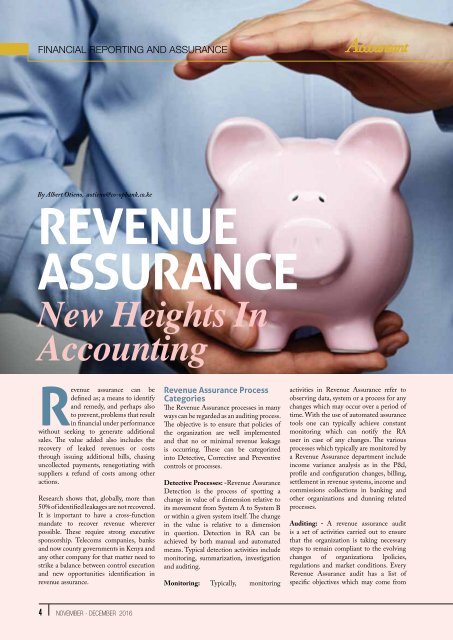The Accountant Nov-Dec 2016
You also want an ePaper? Increase the reach of your titles
YUMPU automatically turns print PDFs into web optimized ePapers that Google loves.
Financial reporting and assurance<br />
By Albert Otieno, aotieno@co-opbank.co.ke<br />
REVENUE<br />
ASSURANCE<br />
New Heights In<br />
Accounting<br />
Revenue assurance can be<br />
defined as; a means to identify<br />
and remedy, and perhaps also<br />
to prevent, problems that result<br />
in financial under performance<br />
without seeking to generate additional<br />
sales. <strong>The</strong> value added also includes the<br />
recovery of leaked revenues or costs<br />
through issuing additional bills, chasing<br />
uncollected payments, renegotiating with<br />
suppliers a refund of costs among other<br />
actions.<br />
Research shows that, globally, more than<br />
50% of identified leakages are not recovered.<br />
It is important to have a cross-function<br />
mandate to recover revenue wherever<br />
possible. <strong>The</strong>se require strong executive<br />
sponsorship. Telecoms companies, banks<br />
and now county governments in Kenya and<br />
any other company for that matter need to<br />
strike a balance between control execution<br />
and new opportunities identification in<br />
revenue assurance.<br />
Revenue Assurance Process<br />
Categories<br />
<strong>The</strong> Revenue Assurance processes in many<br />
ways can be regarded as an auditing process.<br />
<strong>The</strong> objective is to ensure that policies of<br />
the organization are well implemented<br />
and that no or minimal revenue leakage<br />
is occurring. <strong>The</strong>se can be categorized<br />
into Detective, Corrective and Preventive<br />
controls or processes.<br />
Detective Processes: -Revenue Assurance<br />
Detection is the process of spotting a<br />
change in value of a dimension relative to<br />
its movement from System A to System B<br />
or within a given system itself. <strong>The</strong> change<br />
in the value is relative to a dimension<br />
in question. Detection in RA can be<br />
achieved by both manual and automated<br />
means. Typical detection activities include<br />
monitoring, summarization, investigation<br />
and auditing.<br />
Monitoring: Typically, monitoring<br />
activities in Revenue Assurance refer to<br />
observing data, system or a process for any<br />
changes which may occur over a period of<br />
time. With the use of automated assurance<br />
tools one can typically achieve constant<br />
monitoring which can notify the RA<br />
user in case of any changes. <strong>The</strong> various<br />
processes which typically are monitored by<br />
a Revenue Assurance department include<br />
income variance analysis as in the P&l,<br />
profile and configuration changes, billing,<br />
settlement in revenue systems, income and<br />
commissions collections in banking and<br />
other organizations and dunning related<br />
processes.<br />
Auditing: - A revenue assurance audit<br />
is a set of activities carried out to ensure<br />
that the organization is taking necessary<br />
steps to remain compliant to the evolving<br />
changes of organizationa lpolicies,<br />
regulations and market conditions. Every<br />
Revenue Assurance audit has a list of<br />
specific objectives which may come from<br />
4 NOVEMBER - DECEMBER <strong>2016</strong>


















